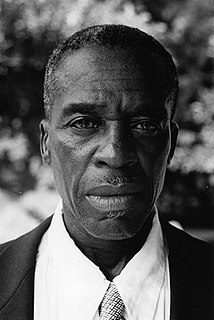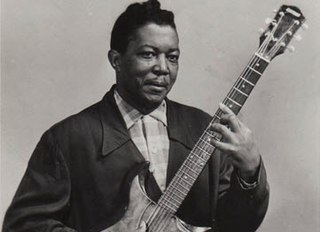Related Research Articles
Blues is a music genre and musical form which was originated in the Deep South of the United States around the 1860s by African-Americans from roots in African-American work songs and spirituals. Blues incorporated spirituals, work songs, field hollers, shouts, chants, and rhymed simple narrative ballads. The blues form, ubiquitous in jazz, rhythm and blues and rock and roll, is characterized by the call-and-response pattern, the blues scale and specific chord progressions, of which the twelve-bar blues is the most common. Blue notes, usually thirds, fifths or sevenths flattened in pitch are also an essential part of the sound. Blues shuffles or walking bass reinforce the trance-like rhythm and form a repetitive effect known as the groove.
Electric blues refers to any type of blues music distinguished by the use of electric amplification for musical instruments. The guitar was the first instrument to be popularly amplified and used by early pioneers T-Bone Walker in the late 1930s and John Lee Hooker and Muddy Waters in the 1940s. Their styles developed into West Coast blues, Detroit blues, and post-World War II Chicago blues, which differed from earlier, predominantly acoustic-style blues. By the early 1950s, Little Walter was a featured soloist on blues harmonica using a small hand-held microphone fed into a guitar amplifier. Although it took a little longer, the electric bass guitar gradually replaced the stand-up bass by the early 1960s. Electric organs and especially keyboards later became widely used in electric blues.

Nehemiah Curtis "Skip" James was an American Delta blues singer, guitarist, pianist and songwriter.

William Pollak known by his stage name of Billy Price, is an American soul singer. He has lived in Pittsburgh, Pennsylvania, since the mid-1970s.
Texas blues is blues music from Texas. As a regional style, its original form was characterized by jazz and swing influences. Later examples are often closer to blues rock and Southern rock.

Manley Augustus Buchanan, better known as Big Youth, is a Jamaican deejay, mostly known for his work during the 1970s.

Money is an unincorporated Mississippi Delta community near Greenwood in Leflore County, Mississippi, United States. It has fewer than 100 residents, down from 400 in the early 1950s when a cotton mill operated there. Money is located on a railroad line along the Tallahatchie River, a tributary of the Yazoo River in the eastern part of the Mississippi Delta. The community has ZIP code 38945 in the Greenwood, Mississippi micropolitan area.

Robert Lee McCollum was an American blues musician who played and recorded under the pseudonyms Robert Lee McCoy and Robert Nighthawk. He was the father of the blues musician Sam Carr. Nighthawk was inducted into the Blues Hall of Fame in 1983.

Five O'Clock Bells is a studio album by Canadian jazz guitarist Lenny Breau that was released in 1979.
Peter B. "Pete" Lowry is an American folklorist, writer, record producer, ethnomusicologist, historian, photographer, forensic musicologist, and teacher who deals with aspects of popular music, mainly African American. Born in Montclair, New Jersey, attending Deerfield Academy, and then Princeton University, where he specialized in the biological sciences. Teaching biology for a few years after obtaining a Master's in zoology, he changed his focus to blues and jazz with a primary focus on the Piedmont blues of the south-eastern United States.
Earwig Music Company is an American blues and jazz independent record label, founded by Michael Frank in October 1978 in Chicago.

Recorded In Hollywood was an independent American record label specializing in rhythm and blues, active from the late 1940s to the end of the 1950s, which issued several sides by artists significant to the genre. John Dolphin operated the label out of his record shop, before selling it to Starday's Don Pierce. Pierce changed the name to Hollywood Records and began releasing re-issues.
Michael Addison Stewart, who performed and recorded as Backwards Sam Firk, was an American country blues singer, fingerstyle guitarist, songwriter, and record collector. Less well known than such contemporaries as Alan Wilson of Canned Heat and John Fahey, Backwards Sam Firk spent much of his music-based existence working with and supporting older blues artists. According to his friend Stephan Michelson, "He was, simply put, masterful. More than technique, he had taste. And more than technique and taste, he had originality. From his mentors and from records he did not so much copy notes as learn sounds and how to make them. He played old-time blues as if he was living in the 1930s, as if this was the music of his day. For him, it was."
Dan Doyle is an American record producer.

Ernest Ray Lane was an American blues pianist. He played various blues musicians and bands, including with Pinetop Perkins, Robert Nighthawk, Ike Turner, George "Harmonica" Smith, and Canned Heat. Lane also released singles and album as a solo artist.

Billy Gayles was an American rhythm & blues drummer and vocalist. Gayles was a member of Ike Turner's Kings of Rhythm in the 1950s with whom he recorded for Flair Records and Federal Records as the lead vocalist. Gayles also backed various musicians, including Earl Hooker, Robert Nighthawk, Otis Rush, Albert King, and Richard Arnold "Groove" Holmes.
Walter Rhodes was an American blues musician, who recorded briefly in the late 1920s and was unusual in being a blues accordionist and singer from Mississippi. It was reported that Rhodes may have been the oldest Delta musician recorded. Little is known of his life outside of his recordings.
Richard "Hacksaw" Harney was an American Delta blues guitarist and pianist. He first entered a recording studio with his brother Maylon in 1928, to wax guitar work backing for separate tracks by Pearl Dickson and Walter Rhodes. However, Harney recorded rarely, until his belated solo album, Sweet Man (1972).
References
- 1 2 Dunlap Jr., David (July 7, 2006). "The Cosmos Club". Washington City Paper . Archived from the original on 2006-08-12. Retrieved March 10, 2010.
- ↑ The Routledge Encyclopedia of the Blues, ed. Edward Komara (New York: Routledge), ISBN 0-415-92699-8
- ↑ "Roy Buchanan". Adelphirecords.com. Retrieved 2016-12-12.
- 1 2 "Adelphi Revamps Foreign Distrib, Ponders Licensing". Billboard. December 24, 1977. p. 18.
- 1 2 Callahan, Jean (September 20, 1980). "No Recession for the Adelphi Label". Billboard. p. 10.
- 1 2 3 4 Komara, Edward M. (2006). Encyclopedia of the Blues. Psychology Press. p. 9. ISBN 9780415926997.
- ↑ Larry Hoffman. "Richard "Hacksaw" Harney – Sweet Man". Parsifal.be. Retrieved 2020-06-20.
- ↑ "4101PatSky". Adelphirecords.com. Retrieved 2016-12-12.